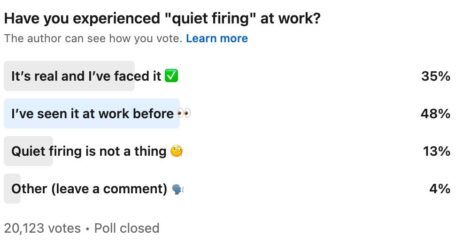The past two years have put a lot of strain on businesses, with the pandemic driving people to push harder than ever to keep companies afloat. As a result, chronic overwork has worsened. According to Gallup, 57% of professionals report finishing their work day with a feeling of complete exhaustion. On top of that, only 23% of employees strongly agree they get the right amount of recognition for their work–a staggeringly low number, especially considering that when recognition hits the mark, employees are 73% less likely to feel burned out. Feeling overworked and undervalued, many have taken a step back to reframe their values and reassess their purpose.
With this state of mind, the concept of ‘quiet quitting’–where professionals quit the idea of going above and beyond at work–has become particularly attractive, especially among Gen-Z professionals. The phenomenon, which stole the spotlight in August after a TikTok video using the term clocked 3.5M views in the first month, describes how some professionals are ‘no longer subscribing to the hustle culture mentality that work has to be your life.’ The video divided opinion and opened the floodgates for a deeper discussion on the world of work: where are we, where are we going, and, more importantly, whether we are building the working environment we want.
The burnout boom fueling quiet quitting has been aggravated by another workplace tragedy: quiet firing. According to Bloomberg, examples of quiet firing include ‘denying raises for years on end, blocking employees from opportunities for growth or promotion, or neglecting to give direct and timely feedback.’ The idea behind quiet firing, it seems, is to make the workplace as unpleasant as possible, encouraging professionals to leave without firing them outright. Given this context, it is disheartening to learn that a LinkedIn poll showed that 83% of professionals said they have personally experienced or witnessed quiet firing.

When considering instances of quiet quitting and quiet firing, it is easy to become caught up in an unflattering, unproductive blame game, alternating between cursing the new generation of workers who appear to be slacking off and criticizing corporate leaders who seemingly put profit before people. However, the disruption caused by the pandemic should not be excluded from the conversation.
When boundaries between work and play, home and office, began to blur, cases of burnout went into overdrive. It is no wonder, then, that chronic disengagement followed suit. According to Gallup, U.S. employee engagement took another step backward during the second quarter of 2022, while ‘quiet quitters’ were found to make up at least 50% of the U.S. workforce. On top of that, only one in four employees strongly agree they feel connected to their culture, and only about one in three strongly agree they belong at their organization. While these stats may unnerve many, great leaders will see a pool of possibility in the data. They will seize the moment to listen to their talent, reconsider their strategies, and enact change.
Arianna Huffington, founder of the Huffington Post and CEO at Thrive, took the lead on this in a LinkedIn post that went viral. She stated we have a ‘once-in-a-generation opportunity to redefine how we work and live.’ While burnout is still an issue to be solved, ‘the desire to do something about it,’ she writes, ‘has never been higher.’ Huffington cites data from Deloitte, which shows that 95% of C-suite executives agree they should be responsible for employee well-being, and 83% say they’ll do more on the issue in the next few years. Ultimately, moving beyond burnout, she states, requires professionals to find a job that ‘inspires you, engages you, and brings you joy.’
Companies should not mold their mission to the fancies of their talent. Leaders should be looking to co-create a purpose-driven culture at work–one that creates community through recognition, builds careers through continuous feedback, and fosters trust through flexibility. The company culture should put people at its core. Gallup research shows that just a 10% improvement in employees’ connection with the mission or purpose of their organization leads to an 8.1% decrease in turnover and a 4.4% increase in profitability.
The lack of clarity that cultivates burnout, the absence of acknowledgment that leads to quiet quitting, and the toxic workplace habits that fuel quiet firing can be tackled. The solution lies in designing an organizational culture that prioritizes people. To do this, leaders must listen to their talent and plan how they will move forward together. Leaders who harness the power of recognition and continuous feedback to make their talent feel valued for their work and help them forge career paths not only create a work culture that increases engagement but one that boosts performance and lowers attrition. Organizational culture dictates purpose, productivity, and profit–and when done right, all three can rise.
StarMeUp is a behavioral science-based solution that helps organizations create a purpose-driven culture–retaining talent, boosting performance, and fostering a sense of workplace belonging. Culture saves the workplace, and StarMeUp gives companies the tools they need to co-create the culture they deserve.
Technology is reshaping the way we connect, particularly when it comes to working culture. Will artificial intelligence improve the way we communicate with each other, or will it amplify the distance and difference between us? How can leaders champion technology and enhance productivity while preventing burnout?
To deep dive further into these issues, join us at Converge, where we will be talking to Arianna Huffington about how technology can be used to empower people.
Huffington is the founder and CEO of Thrive, founder of The Huffington Post, and the author of 15 books, including Thrive and The Sleep Revolution.






